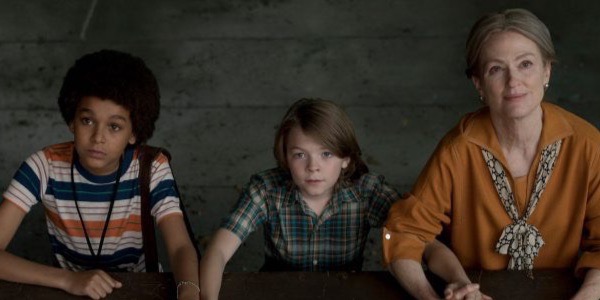Todd Haynes’s latest period piece feels like a love letter that isn’t quite sure who it’s addressing. At first, it appears to be about the wonder of childhood, but then we switch gears, sluggishly, and find ourselves in an ode to silent cinema, but just as fast we’ve transitioned to the museum, as a space of discovery; both of the world and the self. It’s overwhelming, and not in the good way. Of course, there’s no reason why a film can’t pay homage to more than one thing, but Wonderstruck is all over the place.
Plot
The story begins with Ben, a young boy who lives with his relatives following the death of his mother. Frustrated at having never known his father, Ben searches for clues throughout his old house. He finds a note scribbled on a bookmark from a mysterious Danny, lovingly addressed to his mom and immediately knows this to be the man. He calls the number listed, but lightning literally strikes his house as he dials, and this causes him to go deaf.

Undeterred, he escapes from the hospital and takes himself all the way to New York City to find the bookstore from which the bookmark came. As Ben’s story unfolds, we cut back in time to 1927 where Rose, a young girl who is also deaf, similarly leaves her to set out for the Big Apple. Only in her case, she is searching for a famous silent star.
All Over the Place
Wonderstruck was adapted from screenwriter Brian Selznick’s novel of the same name. While the building blocks of the story make it seem ideal for a big screen adaptation, the finished product feels too hung up on its original medium. The editing in particular falls flat with many, if not most, of the cuts from present to past feeling both narratively and aesthetically purposeless. As opposed to thematically overlapping journeys, the two arcs feel choppy, as though they were independently crafted before being hastily spliced together.
This is largely due to the film’s faulty clock-work universe, where coincidences that are meant to inspire a sense of wonder feel overly mechanical and somewhat hollow. The biggest of these, Ben getting struck by lightning, the event that catalyzes the whole film, felt exceptionally off to me.
For starters it didn’t seem to add anything narratively or thematically, save for a half-assed, and unnecessary, attempt at creating further parallel between Ben and Rose’s story. In the latter arc, Rose’s deafness was a factor that shaped, but did not define, her experience. But with Ben, it felt like a gimmick, nothing more a weak device without which the already loose plot would have fallen apart.
Stuttering Story
The script is no help either. Selznick’s dialogue is often tacky, relying heavily on expository dialogue and unconvincing soliloquies. But what’s even worse is the hazy flow of events, the way the plot lurches forward due to completely unmotivated character decisions. This problem manifests across the board from the most minor to the most major points of the story.
Take Ben’s journey: the whole reason he sets out to New York is to find his father. He feels the need to make such a dangerous trip on his own because his mother, now dead, has pretty much never told him a single thing about his father. But why didn’t she? In a flashback scene, we see Ben pestering his mother about his father, doing absolutely everything a child can to communicate that her silence was causing him extraordinary pain. And yet, she says nothing. Absolutely nothing. Why?
This forced shroud thrown over the father’s identity leads the viewer to suspect that something exceptionally traumatic must have defined their relationship. To the contrary, we later discover that this was far, far from the case. So why lock us in such unnecessary suspense for almost two hours? Hell, why do that to a kid for his whole life? It’s borderline cruel.
Still, I can’t help but mourn the film Wonderstruck could have been. Specifically, I can’t help but mourn the film I think Haynes wanted to make. I see it especially clearly in Rose’s arc, the way Haynes commits absolutely everything at his disposable, from the crisp cinematography to the stunning score, to grounding us in her perspective as she runs away from her abusive parents. Her scenes manage to pay homage to silent cinema while crafting their own delightful aesthetic, one that makes majestic use of silence. Millicent Simmonds absolutely shines as the young Rose, going head-to-head seamlessly with Julianne Moore.
Verdict: Wonderstruck
It’s quite a shame that Haynes’s follow-up to the masterful Carol could not live up to its potential, and it had so much. But a weakly structured plot and a plethora of unfocused motifs bog it down from what could have been a striking exploration of childhood and the joys of discovery that come with it. Here’s hoping Haynes gets it better next time.
What would you like to see Todd Haynes do next? Tell us your thoughts in the comments below!
Wonderstruck was released in the United States on October 20, 2017. For all international release dates, see here.
Does content like this matter to you?
Become a Member and support film journalism. Unlock access to all of Film Inquiry`s great articles. Join a community of like-minded readers who are passionate about cinema - get access to our private members Network, give back to independent filmmakers, and more.